LIVING WITH DIGNITY
AIDS in Nigeria
By Sr. Suzanne Marshall, OLM
Summer 2001
Return to Table of Contents
Print Article
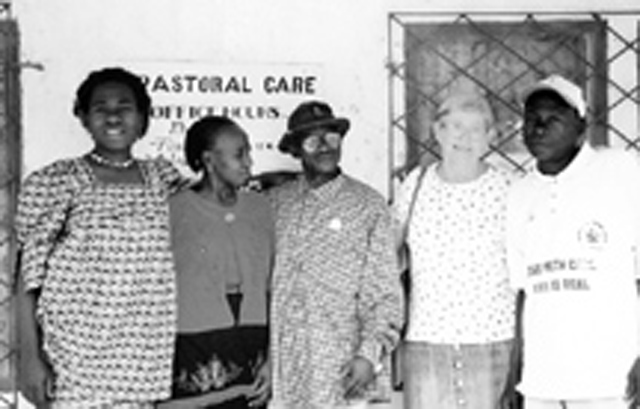 L-R: Sr. Suzanne Marshall (2nd from right) with Judith, Iveren, Augustin and Iormough, pastoral team workers. Sr. Suzanne trains and supervises staff and coordinates the pastoral care program for people with HIV and AIDS at St. Monica’s Hospital in Adikpo, Nigeria.
L-R: Sr. Suzanne Marshall (2nd from right) with Judith, Iveren, Augustin and Iormough, pastoral team workers. Sr. Suzanne trains and supervises staff and coordinates the pastoral care program for people with HIV and AIDS at St. Monica’s Hospital in Adikpo, Nigeria.
“Crimes against humanity,” that’s what Time magazine, in its February 12, 2001, edition, rightly called AIDS in Africa. The statistics are mind-numbing: 17 million Africans have already died from AIDS, at least 25 million are living with the virus; the number of AIDS orphans is impossible to assess accurately. But to us who live here in Benue State, Nigeria, where possibly one in every five persons between the ages of 15 and 49 is infected with the virus, the statistics are personal and heart breaking. The statistics are our friends, our neighbours and our co-workers. We know and love them. We ache to see their suffering and grieve in the face of such destruction. And we are angry, angry at the lack of concern shown by many in the First World, but mostly angry with the pharmaceutical companies and the governments who support them, for the lack of availability of cheap anti-retroviral drugs for Africans with HIV/AIDS.
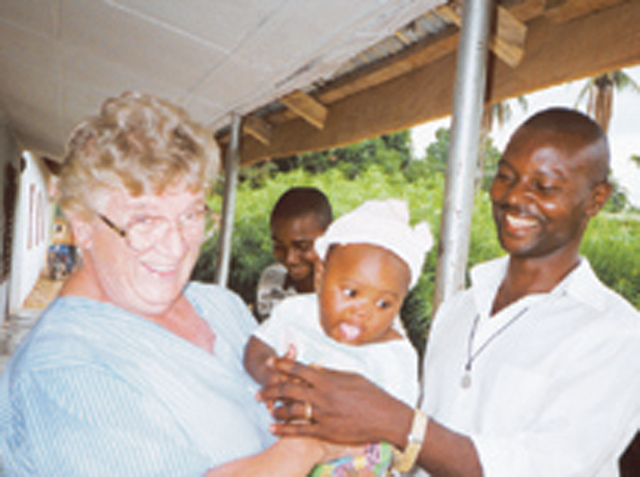 Sr. Mary Deighan with Simon Gbakaan and Simon’s son Sesugh. Simon has worked with her for 14 years in the primary health care program. Sr. Mary is engaged in primary health care and treatment for river blindness in various bush areas. She also trains village health care workers who in turn teach volunteers and family members home care for the sick, especially for the increasing number of persons with HIV and AIDS.
Sr. Mary Deighan with Simon Gbakaan and Simon’s son Sesugh. Simon has worked with her for 14 years in the primary health care program. Sr. Mary is engaged in primary health care and treatment for river blindness in various bush areas. She also trains village health care workers who in turn teach volunteers and family members home care for the sick, especially for the increasing number of persons with HIV and AIDS.
Since 1991 I have been developing services for people with HIV and AIDS and their families in a rural part of Benue State encompassing a radius of 50 kilometres. Mainly I train Nigerians to do pre- and post-HIV test counseling as well as ongoing counseling and support for those infected. We run AIDS awareness programs and support groups for people living with the virus. We mobilize and support home-based care programs in surrounding villages and towns.
No services
In most of Nigeria there are no services for people with HIV and AIDS. Here in our part of Benue State those infected would have no help or comfort if we were not present. We only reach a small minority. Most live wretched, fearful lives rejected by family and friends and are left to die in pain and alone.
A 22-year-old woman, mother of three, died in a nearby village. We only knew her for a short time. The last day she attended one of our clinics she weighed 21 kilograms. Hearing of her death, the pastoral care worker went to her compound. Her body was wrapped in cloth but her exposed face was covered with flies. Her three small children, cowering beside her bed, were the only ones present. Her young husband, also infected, was out looking for money to buy a coffin in which to bury her. Their neighbours stood far back, watching, too frightened to enter the house.
The statistics are our friends, our neighbours and our co-workers. We know and love them. We ache to see their suffering and grieve in the face of such destruction.
Not far away a 13-year-old girl cares for her three-year-old brother who has AIDS. Their parents have already died from the disease. This young girl had to leave school two years ago to care for their mother before she died. They have no one to help them but us.
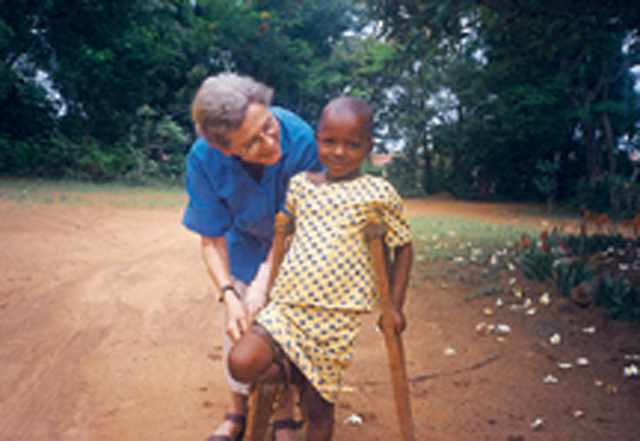 Sr. Rosemarie Donovan works with the physically disable in Vandeikya, Nigeria, to enable them to become respected and productive members of their community. She helps provide assistance for a variety of needs, from physiotherapy, corrective surgery, purchase of a wheelchair or leg braces, to completion of schooling or learning a trade.
Sr. Rosemarie Donovan works with the physically disable in Vandeikya, Nigeria, to enable them to become respected and productive members of their community. She helps provide assistance for a variety of needs, from physiotherapy, corrective surgery, purchase of a wheelchair or leg braces, to completion of schooling or learning a trade.
There is so much superstition and ignorance surrounding AIDS here. Most people who have the virus are afraid to tell anyone including their family. They fear rejection and, if they are employed, the loss of their job. Through counselling we help them see the value of telling at least one family member, usually their mother, sometimes their father or a sibling. When I first speak with a person who has recently tested positive for the virus I pray that he or she has a mother who is reasonably well. It is my experience that it is almost always the mother who will provide the only love and care which that person will receive until death.
Others show love in a different way. Many courageous women and men have done so by revealing their HIV status and joining the fight to stop the spread of AIDS. They have appeared on television and have taken part in awareness campaigns throughout Nigeria. They have marched for AIDS in the state capital and have spoken out in protest when basic human rights have been denied to people with HIV and AIDS.
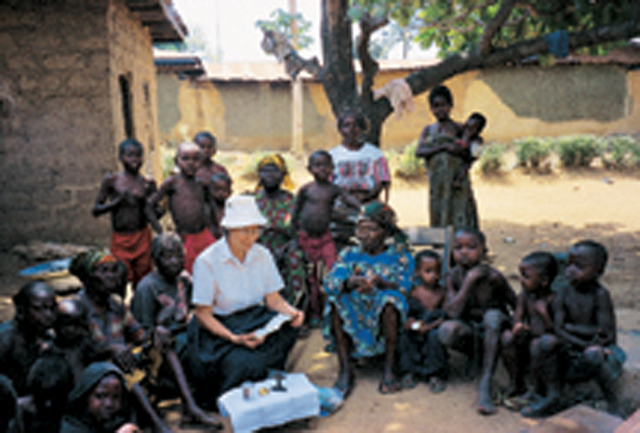 Sr. Gwen Legault carries the Eucharist to the sick in communities in Vandeikya, Nigeria, and through these pastoral visits has brought comfort, strength and peace to the dying. She also teaches at St Francis School for the Deaf and Blind, a school Sr. Gwen founded in 1975 in Vandeikya.
Sr. Gwen Legault carries the Eucharist to the sick in communities in Vandeikya, Nigeria, and through these pastoral visits has brought comfort, strength and peace to the dying. She also teaches at St Francis School for the Deaf and Blind, a school Sr. Gwen founded in 1975 in Vandeikya.
Each of Our Lady’s Missionaries in Nigeria, though committed to another apostolate (Mary Deighan, primary health care; Rosemarie Donovan, the physically disabled; Patricia Kay, drama; Gwen Legault, School for the Deaf; and Rosemary Williamson, catechetics and women’s groups) has been drawn into the AIDS ministry. Mary has offered her services as medical consultant to our support groups who meet monthly. Rosemarie, Patricia, Gwen and Rosemary have carried the Eucharist to the sick and through these pastoral visits have brought comfort, strength and peace to the dying. Patricia, in an effort to change negative attitudes and behaviour towards those infected with HIV, produced a video in the local Tiv language telling the story of a young man who returns to his village after becoming sick and how his family cared for him until he died.
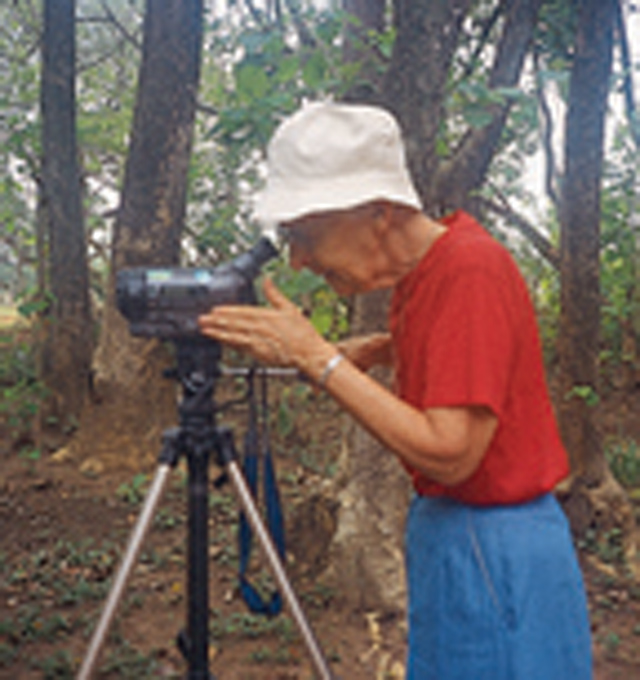 Sr. Patricia Kay of North Sydney, Nova Scotia, produces and directs videos with Tiv youth in Benue State, Nigeria. Many of her earlier videos have been based on some of the best known Bible stories. More recently she has used this medium for the purpose of AIDS awareness.
Sr. Patricia Kay of North Sydney, Nova Scotia, produces and directs videos with Tiv youth in Benue State, Nigeria. Many of her earlier videos have been based on some of the best known Bible stories. More recently she has used this medium for the purpose of AIDS awareness.
The love and concern which each Sister offers is what helps sustain me in this ministry. But the real heros are the Nigerian pastoral care workers who are committed to caring in every way they can for those who suffer from this terrible disease. Their professionalism and compassion make our ministry possible and give those suffering from HIV and AIDS the courage and hope to live each day with dignity.
Return to Table of Contents
Print Article